
Lothar Bisky was a German politician. He was the chairman of the Party of Democratic Socialism (PDS), the successor of East Germany's Socialist Unity Party (SED). In June 2007 he became co-chairman of The Left party, formed by a merger of the PDS and the much smaller Labour and Social Justice – The Electoral Alternative. From 2007 until 2010 he was the President of the Party of the European Left. Also, he was the Publisher of the socialist newspaper Neues Deutschland.
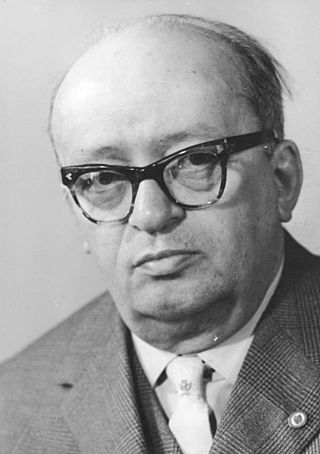
Friedrich "Fritz" Ebert Jr. was a German politician and East German Communist official, the son of Germany's first president Friedrich Ebert.
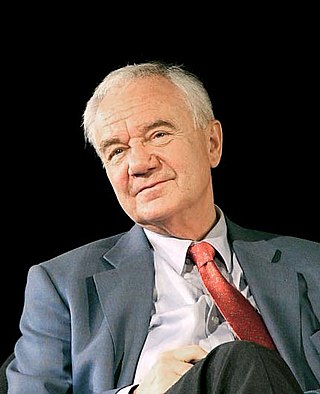
Manfred Stolpe was Federal Minister of Transport, Building and Urban Affairs of Germany from 2002 until 2005. Before, he was Ministerpräsident of the state Brandenburg from 1990 until 2002. Stolpe was, after the state elections following German reunification, the only Social Democratic Minister-President of a state of former East Germany. Stolpe is thought of as the architect of modern Brandenburg and left office with a 74% approval rating. He is credited with forging a new identity for the state, among other things, popularizing the Brandenburglied, though controversy surrounding failed projects and his work for the Stasi came up during his tenure. To date, Brandenburg has only had Social Democratic Minister-Presidents.

Margot Honecker was an East German politician who was an influential member of that country's Communist government until 1989. From 1963 until 1989, she was Minister of National Education of the GDR. She was married to Erich Honecker, the leader of East Germany's ruling Socialist Unity Party from 1971 to 1989 and concurrently from 1976 to 1989 the country's head of state.

The Federal Foundation for the Reappraisal of the SED Dictatorship is a government-funded organisation established in 1998 by the German parliament.

Max Fechner was a German politician who served as Minister of Justice of East Germany from 1949 to 1953
The Politics of Brandenburg takes place within a framework of a federal parliamentary representative democratic republic, where the Federal Government of Germany exercises sovereign rights with certain powers reserved to the states of Germany including Brandenburg. The three main parties are the centre leftist Social Democratic Party of Germany (SPD), the leftist Left Party and the centre rightist Christian Democratic Union.
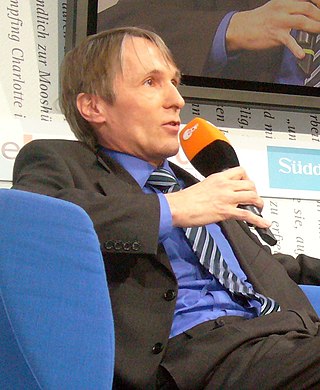
Hubertus Knabe is a German historian and was the scientific director of the Berlin-Hohenschönhausen Memorial, a museum and memorial in a notorious former Stasi torture prison in Berlin. Knabe is noted for several works on oppression in the former communist states of Eastern Europe, particularly in East Germany. He early became involved with Green politics, and was active in the Green Party in Germany.
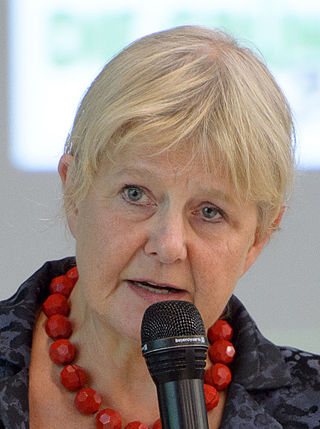
Marianne Birthler is a German human rights advocate and politician of the Alliance '90/The Greens. From 2000 to 2011, she served as the Federal Commissioner for the Stasi Records, responsible for investigating the past crimes of the Stasi, the former communist secret police of East Germany. In 2016 she was offered the nomination of the CDU/CSU and her own party for President of Germany, but after some time decided not to run; the parties would have had a majority in the Federal Convention, securing her the election.

Thomas Nord is a German politician and Member of the German Federal Parliament.
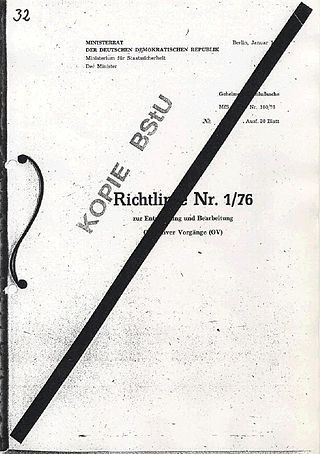
Zersetzung was a psychological warfare technique used by the Ministry for State Security (Stasi) to repress political opponents in East Germany during the 1970s and 1980s. Zersetzung served to combat alleged and actual dissidents through covert means, using secret methods of abusive control and psychological manipulation to prevent anti-government activities. People were commonly targeted on a pre-emptive and preventative basis, to limit or stop politically incorrect activities that they may have gone on to perform, and not on the basis of crimes they had actually committed. Zersetzung methods were designed to break down, undermine, and paralyze people behind "a facade of social normality" in a form of "silent repression".

Helmut Müller-Enbergs is a German political scientist who has written extensively on the Stasi and related aspects of the German Democratic Republic's history.

Thomas Ammer is a German historian who as a young man studied to become a physician. He was arrested and imprisoned in 1958 for anti-government political activism in East Germany and he never qualified as a medical doctor. His 15-year prison sentence was cut short in August 1964 when his release was purchased by the West German government, and at the age of 27 he relocated to the German Federal Republic.
Ehrhart Neubert is a retired German Evangelical minister and theologian.

Two years after German reunification, the Commission of Inquiry for the Assessment of History and Consequences of the SED Dictatorship in Germany, which was a truth commission that lasted from 1992 to 1994, was established by the German government with the objective of looking at the history and the consequences of the former East German communist government. It released its report in 1994, but some felt that more could be investigated. This resulted in the establishment of the Commission of Inquiry on Overcoming the Consequences of the SED Dictatorship in the Process of German Unity lasting from 1995 to 1998, which had the same objective, but investigated more thoroughly.

Irene Ellenberger is a German architect who grew up in East Germany and who in 1990 became a politician (SDP/SPD).

Sylvia Bretschneider was a German teacher, education administrator and politician (SPD). She was a member of the Landtag of Mecklenburg-Vorpommern between 1994 and 2017, taking over as speaker of the state parliament in 2002, and serving in that office, formally, till her death.

Angelika Barbe is a German biologist who became a politician.

Peter-Michael Diestel is a German lawyer and former politician. He was the last Interior Minister of East Germany, under Prime Minister Lothar de Maizière (1990). As such, he represented the DDR in the negotiations on the unification treaty. He was then a member of the Brandenburg state parliament until 1994.

Hildigund Neubert is the daughter of an East German Pastor-Theologian who became a professional musician. As the pressures for change in the one-party dictatorship intensified, thanks both to the bankruptcy of the state and to the winds of Glasnost blowing across from, of all places, Moscow, she found herself drawn by circumstances into politics. At the time of East Germany's "peaceful revolution" she was in East Berlin, a permanent presence at the control centre of Demokratischer Aufbruch . A feature of those months was the dispersed character of the uprisings that destroyed the dictatorship: it is misleading to think in terms of any sort of central "guiding hand" controlling developments. Nevertheless, DA was one of a number of movements and organisations that became key to focusing the energies of hundreds of thousands of pro-democracy campaigners and demonstrators, in ways that led, in March 1990, to the only free and fair parliamentary election in the history of the "German Democratic Republic" and thereafter, more indirectly, to reunification in October 1990.



















